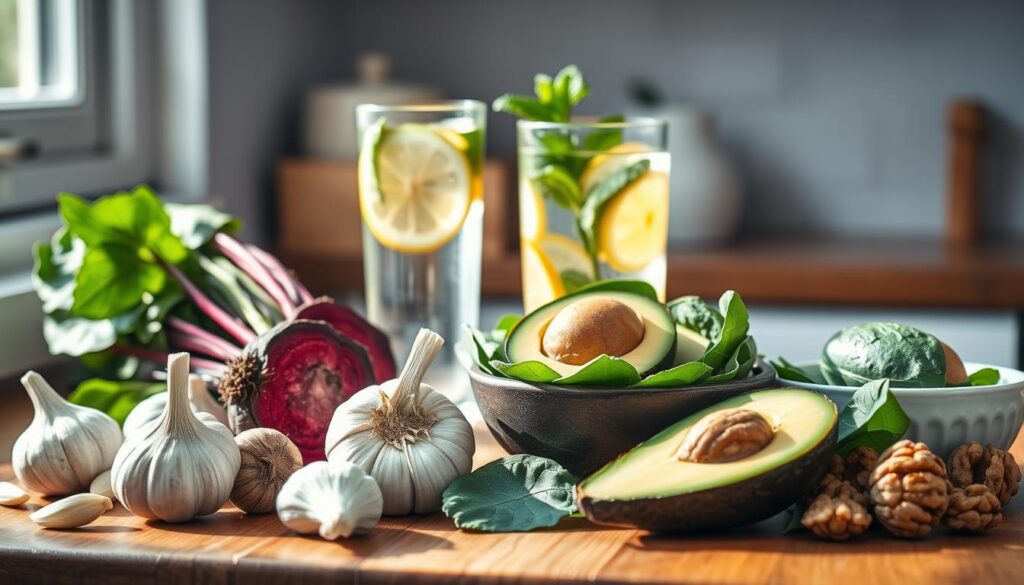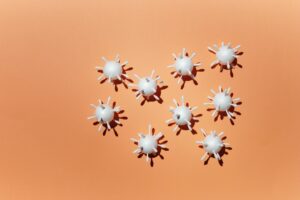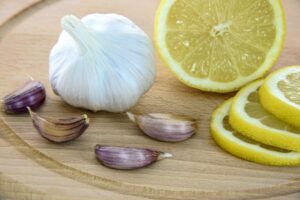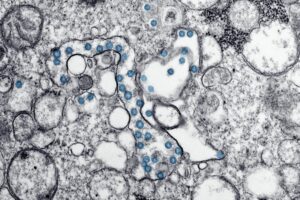Natural Ways to Lower High Blood Pressure
Discover effective natural methods to lower high blood pressure without medication. Learn how to improve your health through lifestyle changes and diet.

High blood pressure, or hypertension, affects millions of people around the world. Many look for natural ways to lower their blood pressure and boost their heart health. This guide will show you the best natural remedies and lifestyle changes to control your blood pressure and reduce hypertension risks.
Key Takeaways
- Eating less sodium and more potassium-rich foods can really help with blood pressure.
- Even moderate exercise can lower blood pressure by making your heart work better.
- Stress-reducing activities like meditation and deep breathing can lessen stress’s impact on your body.
- Herbs like garlic and hawthorn can help control blood pressure.
- Keeping an eye on your blood pressure and tracking changes is key to a healthy life and making needed changes.
Understanding High Blood Pressure
High blood pressure, also known as hypertension, affects millions of people around the world. It’s a key sign of heart health. Knowing about its risks and effects is key to staying healthy.
What is High Blood Pressure?
Blood pressure is the force the blood pushes against artery walls as the heart pumps it. A normal blood pressure range is less than 120/80 mmHg. If it’s 130/80 mmHg or higher, it’s high blood pressure or hypertension.
Risks and Complications
- Increased risk of heart disease, including heart attack and heart failure
- Stroke
- Kidney damage
- Vision problems
- Sexual dysfunction
High blood pressure can lead to serious health issues. This shows why understanding hypertension and managing it is so important.
“Hypertension is often called the ‘silent killer’ because it usually has no symptoms, yet it can significantly increase the risk of heart disease, stroke, and other life-threatening conditions.”
Checking blood pressure often and making lifestyle changes are key. They help keep your heart healthy and lower the risk of serious problems.
Dietary Changes to Lower Blood Pressure
Changing your diet is key to lowering high blood pressure naturally. By making smart food choices, you can improve your heart health and lower hypertension risks.
Eating more fruits, vegetables, and whole grains is a great way to lower blood pressure. These foods are full of potassium, fiber, and antioxidants. They help keep your blood pressure healthy.
- Aim for at least five servings of fruits and vegetables per day, focusing on leafy greens, berries, and citrus fruits.
- Incorporate more whole grains, such as brown rice, quinoa, and whole wheat bread, into your meals.
- Choose lean proteins, such as chicken, fish, and legumes, to reduce your intake of saturated fats.
It’s also important to eat less sodium to help control blood pressure. Try reducing salt by eating fewer processed and canned foods and using herbs and spices for flavor.
“A diet rich in fruits, vegetables, and whole grains can lower blood pressure by as much as 11 mm Hg, a reduction comparable to that of some blood pressure medications.”
By focusing on foods that reduce hypertension, you can help manage your high blood pressure. This can also boost your overall heart health.
How to Lower High Blood Pressure Naturally
Lowering blood pressure naturally is more than just about what you eat. It’s also about changing your lifestyle. Regular exercise and managing stress are key to reducing hypertension.
Increase Physical Activity
Regular physical activity is a great way to lower blood pressure. Try to do at least 30 minutes of moderate exercise, like walking, swimming, or cycling, every day. This keeps your heart healthy and helps reduce hypertension.
Manage Stress Levels
High blood pressure often comes from stress. Adding stress-management techniques to your life can help lower your blood pressure. Meditation, deep breathing, or other relaxation methods are good options to manage hypertension and boost your well-being.
Combining exercise with stress management is a great way to reduce high blood pressure naturally. These methods can help you improve your heart health without just using medicine. They work well with any diet changes you make.
“Regular exercise and stress management are essential for maintaining healthy blood pressure levels.”
Lifestyle Modifications
Healthy lifestyle changes can help lower high blood pressure. Focusing on quitting smoking and reducing alcohol intake is key. These changes can greatly reduce hypertension.
Quit Smoking
Smoking is a big risk for high blood pressure. Quitting can greatly improve heart health. Smoking damages blood vessel linings, making them narrow and reducing blood flow.
By quitting smoking, you can lower your blood pressure. This also cuts the risk of heart disease, stroke, and other serious issues.
Limit Alcohol Intake
Drinking too much alcohol can also raise high blood pressure. It makes the heart work harder, increasing blood pressure. People with hypertension should limit alcohol intake.
They should stick to one drink a day or avoid it altogether.
| Lifestyle Change | Impact on Blood Pressure |
|---|---|
| Quit Smoking | Significant reduction in blood pressure and cardiovascular risk |
| Limit Alcohol Intake | Moderate reduction in blood pressure levels |
By making these important lifestyle changes for high blood pressure, you can manage your condition better. This improves your health and well-being.
Herbal Remedies for High Blood Pressure
Many people with high blood pressure are looking at natural herbal remedies. Garlic and hawthorn are two herbs that have been studied a lot. They might help lower blood pressure.
Garlic and Hypertension
Garlic is a common food item that has been used for a long time to help control blood pressure. Studies now show it can relax blood vessels and improve blood flow. It might also lower cholesterol levels, which is good for the heart.
Studies have shown that taking garlic supplements can help lower blood pressure. This is true for both the top and bottom numbers. The key ingredient in garlic, allicin, seems to be the reason for this effect.
Hawthorn for Hypertension
Hawthorn is a type of shrub that has been looked at for managing high blood pressure. It has antioxidants and other compounds that might help widen blood vessels. This can improve blood flow and support a healthy heart.
Research has found that hawthorn extracts can lower blood pressure in people with mild to moderate hypertension. The usual dose is between 160-900 mg a day, split into several doses.
Remember, herbal supplements can be helpful but shouldn’t replace your regular medicine or doctor’s advice. Always talk to your healthcare provider before adding new supplements to your treatment plan for high blood pressure.
| Herb | Potential Benefits for Hypertension | Recommended Dosage |
|---|---|---|
| Garlic | Relaxes blood vessels, improves blood flow, and lowers cholesterol | Typically 600-1,200 mg per day of garlic supplements |
| Hawthorn | Dilates blood vessels, improves blood flow, and supports heart health | 160-900 mg per day, taken in divided doses |
“Herbal remedies can be a valuable addition to a comprehensive approach to managing high blood pressure, but they should never replace conventional medical treatment. It’s crucial to work closely with your healthcare provider to develop a tailored plan that addresses your specific needs.”
Mind-Body Practices
Adding mindfulness and meditation to your daily life can help lower high blood pressure naturally. These practices can make a big difference by helping you relax, manage stress, and boost your heart health.
Meditation and Deep Breathing
Meditation is a great way to lower blood pressure. It calms the mind, reduces stress, and activates the body’s relaxation response. Studies show that regular meditation can lead to lower blood pressure and a lower risk of heart problems.
Adding deep breathing to meditation can make it even more effective. Deep breathing, or diaphragmatic breathing, slows down your heart rate and helps you relax. This can help lower your high blood pressure.
- Aim to meditate for 10-15 minutes a day, focusing on your breath and letting go of thoughts.
- Practice deep breathing by inhaling slowly through your nose, holding your breath, and exhaling slowly through your mouth.
- Try different meditation types, like mindfulness, mantra, or guided meditations, to see what works best for you.
Adding these practices to your daily routine can be a strong addition to other lifestyle changes. It can help you manage high blood pressure and improve your heart health.

Monitoring and Tracking Progress
Keeping a close eye on your blood pressure is key to lowering it naturally. By measuring it at home often and keeping records, you learn how your changes work. This helps you see if you’re moving in the right direction.
Here’s why checking your blood pressure often is important:
- It keeps you updated on your blood pressure levels and spots any changes.
- It lets you see how your diet, exercise, and stress handling affect your blood pressure.
- It helps you tweak your plan to hit your blood pressure goals.
For home blood pressure checks, get a good monitor. These devices are simple to use and give accurate readings, helping you track your progress in lowering hypertension. Try to take readings at the same time every day, like morning and night, for a full view of your blood pressure.
Don’t forget to visit your doctor regularly too. They can spot health issues or risks that might be raising your blood pressure. Your doctor can also offer tailored advice for your treatment plan.
Staying on top of your blood pressure is crucial for lowering it naturally. By being diligent and keeping records, you make better choices and celebrate your successes.
“Monitoring your blood pressure at home is one of the most effective ways to stay on top of your heart health and ensure your natural treatment plan is working.”
When to Seek Medical Advice
Natural methods can help manage high blood pressure, but sometimes you need to see a doctor. Knowing when to get help is key. Look out for signs that mean you should talk to a healthcare professional.
Signs and Symptoms
If you notice any of these, you should see a doctor:
- Severely elevated blood pressure, with readings consistently over 140/90 mmHg.
- Sudden and unexplained changes in your blood pressure levels.
- The presence of other health conditions, such as diabetes or kidney disease, which can impact blood pressure management.
- Persistent or worsening symptoms of uncontrolled hypertension, including headaches, dizziness, chest pain, or shortness of breath.
If you’re using natural remedies but your blood pressure stays high, get medical advice. A healthcare provider can find out why and help you manage your high blood pressure.
| Symptoms of Uncontrolled Hypertension | Importance of Consulting a Healthcare Provider |
|---|---|
|
|
It’s important to talk to a healthcare provider about your high blood pressure, no matter what methods you use. They can guide you and support you in keeping your blood pressure healthy and help you lower your high blood pressure.

Combining Natural and Medical Treatments
Managing high blood pressure often means using both natural and medical treatments. By making lifestyle changes and taking medicines as your doctor suggests, you can improve your heart health. This approach helps you manage your condition better.
This way, you can use integrate natural and conventional treatments for high blood pressure. It also lets you combine lifestyle changes and medication for hypertension in a way that fits you. This is key for people who need both natural and medical help to control their blood pressure.
Working with your healthcare team, you can create a plan that looks at the whole picture of managing high blood pressure. This might mean eating better, finding ways to reduce stress, and keeping an eye on your progress. All while making sure your medicines work well with everything else you’re doing.




